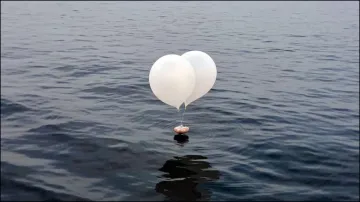North vs South Korea: An unusual psychological warfare involving trash-filled balloons, K-Pop on loudspeakers
The conflict started when North Korea sent over 1,000 balloons filled with trash and manure in retaliation towards anti-Pyongyang propaganda leaflets flown in from Seoul. South Korea retaliated by blasting loudspeaker broadcasts including world news, criticism of Kim Jong Un and K-pop music.

Seoul: No one predicted that when North Korea sent hundreds of trash-filled balloons to its arch-rival Seoul, it would kick-start an unusual form of conflict. However, as tensions between the two Koreas deteriorate, South Korea has decided to resume loudspeaker broadcasts that include news, criticism of the North Korean government and K-pop music, which seems to have further aggravated Pyongyang.
The decision to resume the loudspeaker broadcasts, as a form of psychological warfare, was made after North Korea began launching on Saturday about 1,00 balloons with trash attached, with about 80 of them dropping over the border, South Korea's military said. "The measures we will take may be unbearable for the North Korean regime but they will send a message of hope and light to the North's troops and its people," South Korea's National Security Council said.
The conflict began when Pyongyang sent over 1,000 balloons filled with trash and manure over the last couple of weeks in retaliation towards South Korean civilian groups using balloons to fly anti-North Korean propaganda leaflets across the border. Kim Jong Un's regime is usually extremely sensitive to outside criticism of its authoritarian rule. The tit-for-tat over speakers and balloons has deepened tensions between the Koreas as talks over the North's nuclear ambitions remain stalled.
South Korea's broadcasts include world news and information about democratic and capitalist society with a mix of popular K-pop music. The sound is believed to travel more than 20 kilometres (12.4 miles) into North Korea. Pyongyang has in the past shown some of the angriest reactions towards Seoul's loudspeaker broadcasts and leaflet campaign, in some cases firing weapons at the balloons and speakers.
North Korea sending more balloons, installing its own loudspeakers
Now, the South Korean military on Monday said it's detecting signs that North Korea is installing its own loudspeakers along their heavily armed border following Seoul blasting anti-Pyongyang propaganda broadcasts. This is heavily reminiscent of the Cold War style of psychological warfare. The last time Seoul used loudspeakers was in 2015, to which North Korea responded by firing artillery rounds across the border.
Seoul's Joint Chiefs of Staff didn't immediately comment on the number of suspected North Korean speakers or where along the border they were spotted being installed. It said the speakers were still silent as of Monday afternoon. Additionally, it said that more balloons had been launched by the North and could fly into the South, warning residents to not touch any objects they find attached to balloons.
After sending the trash-filled balloons, North Korea on June 2 said it would halt the move because 5 tons of trash it sent was probably enough to get the message across. However, it vowed to resume if leaflets are again flown from the South by sending a hundred times the amount. A group of South Korean activists defied the warning and have since flown more balloons to the North with leaflets criticising its leader Kim Jong Un together with USB sticks containing K-pop videos and dramas, and US dollar notes.
Kim Jong Un's sister warns South Korea
Following South Korea's decision to blast loudspeaker broadcasts, Kim Jong Un's influential sister Kim Yo Jung had warned of a new response against Seoul if they continued their course. "If the ROK simultaneously carries out the leaflet scattering and loudspeaker broadcasting provocation over the border, it will undoubtedly witness the new counteraction of the DPRK," she said.
Kim, a vice department director in the ruling Workers' Party, called it a "prelude to a very dangerous situation" after sending 1,400 trash-filled balloons. The US-led United Nations Command (UNC), which oversees the armistice that established the Demilitarized Zone between the two Koreas as the fighting ended in the 1950-1953 Korean War, has said it is conducting an investigation into the balloons, including the reports of possible decal matter and other waste products.
South Korea stopped the broadcasts under an agreement signed by the two Korea's leaders in 2018 but tensions have mounted since then as Pyongyang pushed ahead with weapons development. Pyongyang is extremely sensitive to such material and fears it could demoralise front-line troops and residents and eventually weaken leader Kim Jong Un's grip on power, analysts say.
(with inputs from agencies)
ALSO READ | North Korea fires another barrage of ballistic missiles as tensions flare with South Korea